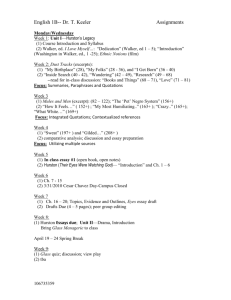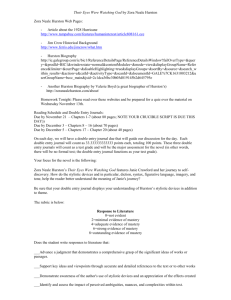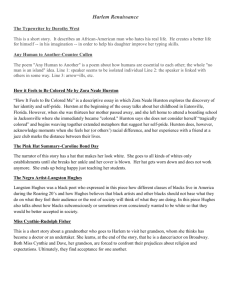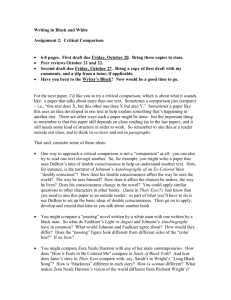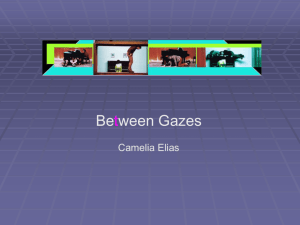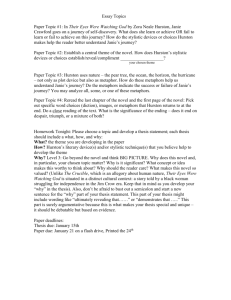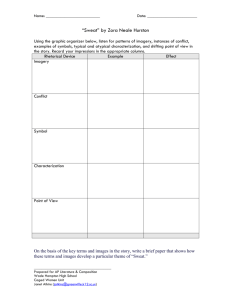Their Eyes Were Watching God_Floros
advertisement
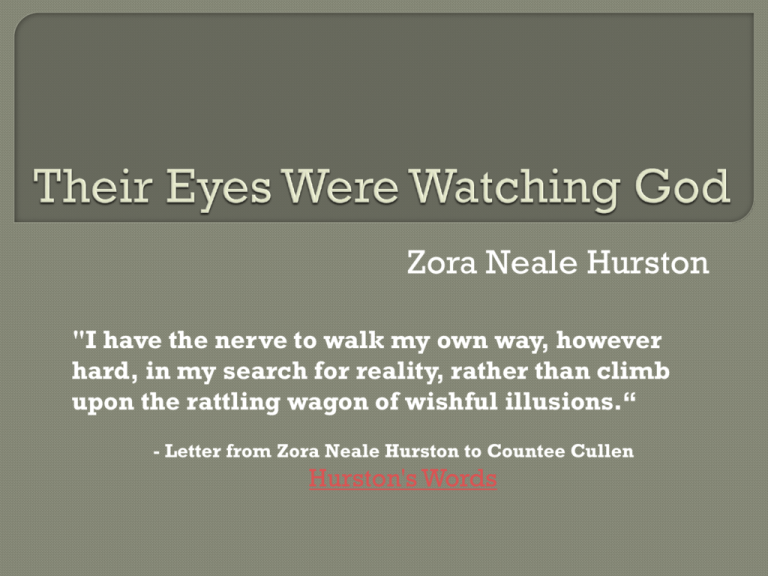
Zora Neale Hurston "I have the nerve to walk my own way, however hard, in my search for reality, rather than climb upon the rattling wagon of wishful illusions.“ - Letter from Zora Neale Hurston to Countee Cullen Hurston's Words Students will analyze how author’s construct characters and how characters affect theme Students will evaluate Hurston’s use of dialect and its effects on the reader Students will connect historical and biographical information with the text Students will apply appropriate critical strategies to the text Writer, folklorist, anthropologist Rambunctious • “Jump[ed] at the sun” Charming • “Walk[ed] into hearts” Intelligent Confident Humorous Hotheaded Born in Alabama, but Eatonville, FL was home Relatively happy childhood until the death of her mother. Hurston was 13. • “That hour began my wanderings…in time…in spirit.” Eatonville provided a culturally affirming environment amidst the prejudice and segregation that was rampant in most of the rest of the country 10 years for an education In 1925, her story, "Spunk," and her play, "Color Struck," won second place in a literary contest Studied anthropology at Barnard College • Conducted field research—focused on the folklore and culture of African Americans • Harlem, throughout the rural south, Haiti Used her own experience, her research and her creativity to create her work • Responsible for preserving the folk traditions and cultural heritage of African Americans Charlotte Osgood Mason—wealthy, white patron “guided” Hurston’s work Provided both opportunity and restrictions Advocated “writing for art's sake—contrary to writers such as Locke and Du Bois, who urged blacks to reflect a racial perspective, especially in portraying relationships with whites.” Two failed marriages • marriage was doomed "to an early, amicable divorce" • Career was priority • Hurston is know to have written Sheen, remembering the “idealistic dreams they shared in their youth, regretting nothing because she lived her life to the fullest” Died penniless and forgotten • Grave unmarked until 1973 Interest in 1960 in Hurston and work renewed by Alice Walker— “In Search of Zora Neale Hurston” One of the most significant writers of the 1900s 4 novels, folklore, many short stories, an autobiography, essays, articles and plays Influenced and inspired many brilliant writers: Ralph Ellison, Toni Morrison, Gayle Jones, Alice Walker, and Toni Cade Bambara Their Eyes Were Watching God First published in 1937 Largely ignored by male reviewers Reissued in 1978 to staggering popularity “There is no book more important to me than this one.”—Alice Walker The Great Depression • “Land of hope and opportunity to land of despair” Racism as strong as ever, especially in the southern states The New Deal • Gave black Americans opportunities lacked in the past • Brought their struggles to light for the Northerners The Federal Music Project, Federal Theatre Project, and Federal Writers Project • enabled black artists to find work during the depression • art or stories which portrayed the historic and present situation of blacks in the South. End of WWI—middle of the Great Depression “alienation, marginality, folk material, the use of the blues tradition, the problems of writing for an elite audience” W. E. B. Dubois coined the term “two-ness,” the awareness of your identity divided in two: "One ever feels his twoness - an American, a Negro; two souls, two thoughts, two unreconciled stirrings: two warring ideals in one dark body, whose dogged strength alone keeps it from being torn asunder." “More than just a literary movement: it included racial consciousness, "the back to Africa" movement led by Marcus Garvey, racial integration, the explosion of music particularly jazz, spirituals and blues…” Based on what you know of Hurston’s life, why does she write Their Eyes Were Watching God? What parallels can you draw between the story and her life? The characters and her life? “Her placid childhood and privileged academic background are often cited as major reasons for her work's general lack of stress on racism…” (Columbia Encyclopedia). • What do you think? Does Hurston fail to emphasize racism in There Eyes Were Watching God? • If racism is not the focus, then what is? Why? Is Hurston doing a disservice by not focusing on the racism that was so ubiquitous in society at that time? A writer's material is controlled by publishers who think of the Negro as picturesque. ... There is an oversimplification of the Negro. He is either pictured by the conservatives as happy, picking his banjo, or by the so-called liberals as low, miserable, and crying. The Negro's life is neither of these. Rather, it is in-between and above and below these pictures." “I used to climb to the top of one of the huge chinaberry trees which guarded our front gate and look out over the world. The most interesting thing that I saw was the horizon.... It grew upon me that I ought to walk out to the horizon and see what the end of the world was like” (Hurston). • How might this interpretation affect our interpretation of theme and purpose? African-American vernacular, including rhythm and word choice and oral features of heard speech Colorful figurative language, in particular, metaphors and imagery Personification Biblical allusions and religious imagery Contrast between diction and tone of omniscient narrator and first person speakers Italicized opening sentence for each chapter Name symbolism How does each character contribute to the theme of Their Eyes Were Watching God? What does each character come to represent? To what extent does Janie acquire her own voice and the ability to shape her own life? How are the two related? Does Janie's telling her story to Pheoby in flashback undermine her ability to tell her story directly in her own voice? In what ways does Janie conform to or diverge from the assumptions that underlie the men's attitudes toward women? How would you explain Hurston's depiction of violence toward women? After Joe Starks's funeral, Janie realizes that "She had been getting ready for her great journey to the horizons in search of people; it was important to all the world that she should find them and they find her." • Why is this important "to all the world"? • In what ways does Janie's self-awareness depend on her increased awareness of others? How important is Hurston's use of vernacular dialect to our understanding of Janie and the other characters and their way of life? What do speech patterns reveal about the quality of these lives and the nature of these communities? In what ways are "their tongues cocked and loaded, the only real weapon" of these people? • What is lost if their words are captured in the “standard English” of the time? "When I went about asking, in carefullyaccented Barnardese, `Pardon me, do you know any folktales or folk-songs?' the men and women who had whole treasuries of material seeping through their pores looked at me and shook their heads. No, they had never heard of anything like that around here. Maybe it was over in the next county. Why didn't I try over there?" Feminism Deconstruction Psychoanalytical Evaluate: Which of the interpretations is most valid? Explain and support your answer After reading the novel, learning about the Hurston’s background, as well as analyzing character and theme, what do you think was Hurston’s main purpose in writing Their Eyes Were Watching God?
